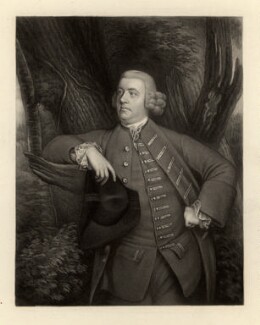William Almack facts for kids
William Almack (1741–1781) was a clever English businessman. He started out as a valet, then became a merchant and owned a tavern. But he became famous for creating very fashionable clubs and special party places in London. His Almack's Coffee House later became Brooks's, a well-known gentlemen's club.
Contents
William Almack's Story
William Almack came to London when he was young. He worked as a valet for the Duke of Hamilton. Later, in the mid-1700s, Almack became the owner of the Thatched House Tavern in St. James's Street.
Starting Famous Clubs
Before 1763, Almack opened a special club in Pall Mall. It was called Almack's Club. From then until he passed away, he was the top person for entertaining London's fancy society.
Some of the first 27 members of Almack's Club were important people like the Duke of Portland and Charles James Fox. Later, famous figures like Edward Gibbon and William Pitt also joined.
Brooks's Club Begins
In 1764, 27 men, including four dukes, started Brooks's. This is one of London's most exclusive gentlemen's clubs. William Almack managed its first building in Pall Mall. He also set up the very famous Almack's Assembly Rooms nearby. The club is named after Almack's helper, Brooks.
Almack's Club was known for its high-stakes games. A writer named Horace Walpole once said in 1770 that the games there were "worthy of the decline of our empire." The club later went to other owners, but it still exists today as Brooks's.
Almack's Assembly Rooms
In 1764, Almack built large assembly rooms in King Street, St. James's. He used the money he earned from his earlier businesses. These rooms are what he is most famous for.
They opened on February 20, 1765, even before they were fully finished. On the opening day, not many people came. But the Duke of Cumberland and Horace Walpole were among the visitors. It was very cold that day. Horace Walpole wrote that Almack advertised the new room was built with "hot bricks and boiling water" to get people to come!
Success of the Rooms
The new rooms quickly became very popular. For more than 75 years, weekly dances were held there. These dances happened for 12 weeks during each London social season.
Tickets cost ten guineas each. A group of important ladies, called "lady-patronesses," controlled who got tickets. They were a small but powerful group. At the start of the 1800s, getting into Almack's was seen as the "seventh heaven of the fashionable world." Its great reputation lasted until around 1840. Many other clubs, like the Dilettanti Society, also met at Almack's rooms.
Almack's Later Life
People say Almack lived in Hounslow in his later years. He gathered a lot of wealth. He passed away on January 3, 1781.
He left his assembly rooms to his niece, who was married to a Mr. Willis. That's why the rooms are now called Willis's Rooms. Almack married Elizabeth Cullen. She was a waiting-maid to the Duchess of Hamilton. Elizabeth was also the sister of Dr. Cullen, a famous doctor. Almack and Elizabeth had two children: William, who became a lawyer, and Elizabeth. Elizabeth married David Pitcairn, a doctor to the Prince of Wales.
See also
 | DeHart Hubbard |
 | Wilma Rudolph |
 | Jesse Owens |
 | Jackie Joyner-Kersee |
 | Major Taylor |


